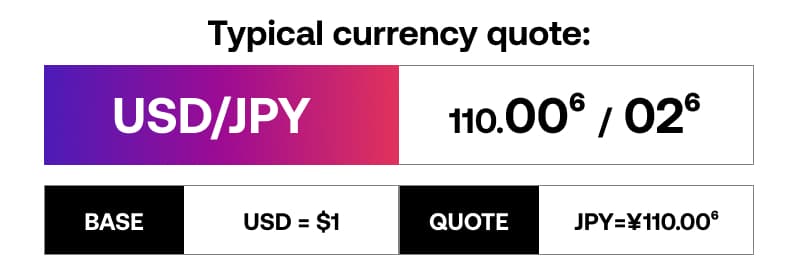
Introduction to financial markets
Trading forex
Foreign exchange (forex) or FX trading involves trading the prices of global currencies, and at City Index it is possible to trade on the prices of a huge range of global currencies. Forex trading allows you to speculate on the movement of one currency against another, and is traded in pairs, for example the Euro against the US Dollar (EUR/USD).
A market that doesn’t sleep
Currency markets are open 24 hours a day. There is no central exchange for trading forex: instead prices are determined by interbank trading, the exchange of currencies between banks on a constant basis, all over the world.
The forex market is the biggest financial market in the world. According to the Bank for International Settlements, it has a turnover of more than $7.5 trillion each day.

Currency pairs
Currencies are traded in pairs – this means you can only trade one currency against another. You can’t trade a currency in isolation. Each currency has its own three letter code, for example, the US Dollar is abbreviated to USD.
Most currency trading features one of the following as part of a pair:
|
Australian Dollar |
AUD |
|
US Dollar |
USD |
|
Euro |
EUR |
|
Japanese Yen |
JPY |
|
British Pound |
GBP |
|
Canadian Dollar |
CAD |
|
Swiss Franc |
CHF |
Taking a typical currency quote, here we have the USD/JPY pair. This shows how many units of the currency on the right, in this case the Yen, you can buy with the currency on the left, namely the US Dollar.
If traders are positive on the prospects for the Yen, they would expect the number on the right to go down – i.e. the Yen would be getting stronger against the Dollar. Traders would be buying less Yen with a Dollar as the Yen got stronger. Similarly, if the Yen was expected to weaken, forex traders would expect the Yen number to go up, reflecting the fact that the dollar could buy more yen.

Currency markets never decline in absolute terms – for one currency to go up, there will be others weakening against it. All currencies cannot go up at the same time. There is always going to be a loser.
Who trades currency markets?
Currency markets are important to a broad range of participants, from banks, brokers, hedge funds and investor traders who trade FX. Any company that operates or has customers overseas will need to trade currency.Central banks can also be active in currency markets, as they seek to keep the currency they are responsible for trading within a specific range.
What moves currency markets?
- Economic data
This particularly affects critical areas of a country’s economy like inflation, unemployment numbers, foreign trade or payrolls. - Central banks
They can have a big influence over the performance of currencies, for example by changing interest rates or printing more money. Central banks can also buy and sell their own currency in order to keep it trading within a certain level. - Political factors
Increasingly, political uncertainty can drive currency markets. For example, the Swiss Franc has traditionally been seen as a safe haven currency. Something as banal as a speech by a finance minister can have a big impact on a currency.
Trading FX with City Index
- When trading with City Index, you are not buying or selling actual currency – rather you are speculating on the price movement between FX pairs
- City Index offers prices on all the major currency pairs as well as many minor currencies
- Spreads start from 0.5pts on some major currency pairs
- You can trade FX with City Index either through CFDs or in smaller lots.






